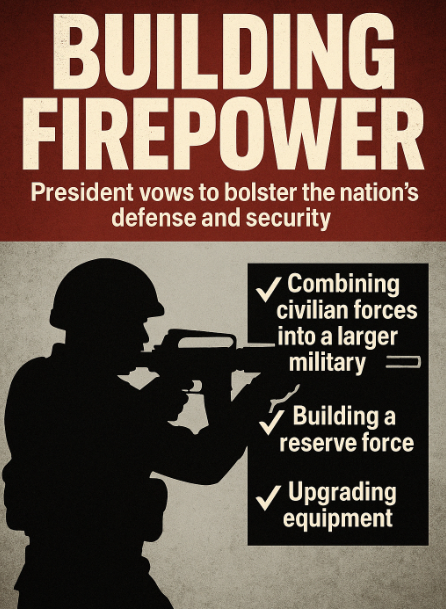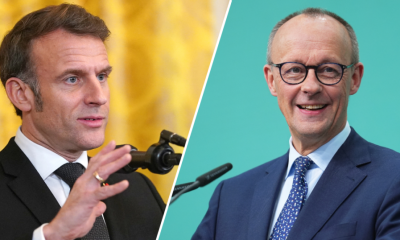Top stories
Zuckerberg Pressures Trump to Shield US Tech Giants from EU Fines

Meta CEO calls EU antitrust penalties a “strategic disadvantage” and urges Trump to defend American tech dominance.
Meta CEO Mark Zuckerberg has called on President-elect Donald Trump to intervene against the European Union’s antitrust fines targeting American tech companies, describing them as akin to tariffs undermining U.S. strategic interests. Speaking on the Joe Rogan Experience podcast, Zuckerberg argued that the EU’s aggressive penalties, which have totaled over $30 billion in two decades, disproportionately affect the United States’ strongest industries.
Zuckerberg criticized the outgoing Biden administration for failing to counter the EU’s actions, suggesting it emboldened Brussels to levy significant fines against firms like Meta, which was recently hit with a €797 million penalty. “If some other country was screwing with another industry that we cared about, the U.S. government would probably put pressure on them,” Zuckerberg said, expressing optimism that Trump would adopt a more protective stance toward American businesses.
The Meta chief’s comments come as the company makes moves seemingly aligned with the incoming administration’s policy preferences. Meta recently announced plans to end its third-party fact-checking program and dismantle diversity, equity, and inclusion (DEI) initiatives, signaling a pivot to policies likely to resonate with Trump’s base.
Zuckerberg’s comparison of EU fines to tariffs underscores his broader argument that antitrust measures serve as economic barriers designed to curb U.S. tech dominance. “It’s a strategic advantage for the United States that we have a lot of the strongest companies in the world,” he stated, calling on the U.S. government to defend American tech interests.
As Trump prepares to take office, Zuckerberg’s public appeal signals a potential shift in the U.S. approach to international regulatory disputes. Whether the incoming administration takes up the tech industry’s cause remains uncertain, but Meta’s overtures highlight the growing tension between Silicon Valley and the EU’s regulatory apparatus.
Editor's Pick
Turkey’s Somali Oil Grab: A Strategic Coup or Neocolonial Exploitation?

Ankara secures 90% of Somalia’s oil and gas profits in landmark deal, sparking fears of energy colonialism under the guise of partnership.
Turkey’s new hydrocarbons deal with Somalia grants it 90% of all oil and gas output with zero upfront costs, raising questions about sovereignty, exploitation, and geopolitical consequences in the Horn of Africa.
Turkey didn’t just strike oil in Somalia — it struck gold. In a sweeping hydrocarbons agreement now before the Turkish Parliament, Ankara has secured 90% of Somalia’s oil and gas output, full export rights, zero upfront costs, and even the legal turf of arbitration on its own soil. Welcome to the 21st-century blueprint of “soft conquest” — wrapped in partnership, sealed with military escorts.
Somalia, teetering between internal fragility and global neglect, has offered up its vast offshore reserves to Turkey on terms that defy global industry norms. No signature bonuses. No surface fees. Only 5% royalties capped for Somalia, and Turkish corporations get to walk away with the lion’s share — free to export, sell, and profit without local interference.
This isn’t partnership. It’s a power grab masquerading as cooperation.

Text of the hydrocarbon agreement between Turkey and Somalia.
Worse still, Turkey can assign its rights to any foreign third party without even opening a local office — a clause that opens the door for opaque subcontracts and external interference in Somalia’s maritime zones. Turkish warships, under the pretext of anti-piracy missions, will escort deep-sea drill ships come September. But what they’re really guarding is Ankara’s geopolitical gamble — a stranglehold on East Africa’s most lucrative energy basin.
The optics are troubling. Somalia’s government, seeking legitimacy and allies, is locking itself into a long-term dependency that gives away critical sovereignty in exchange for vague promises of training and defense aid. If oil is supposed to be Somalia’s path to self-reliance, this deal builds a highway — but Turkey is behind the wheel.
As the global energy chessboard tilts eastward, Somalia risks being reduced to a pawn — or worse, a client state. The message to Mogadishu’s elites is clear: either rewrite this deal, or history will.
How Turkey’s Strategy in Africa Capitalizes on Anti-Western and Anti-China Sentiments
Turkey’s High-Tech Aid to Somalia: Akinci Drones Set to Transform Anti-Terror Strategy
Erdogan’s Ottoman Hustle: How Turkey Is Playing Trump to Crush American Business in Africa
Erdogan’s Horn of Africa Power Grab: Is the Turkish Military Winning Somalia’s Capital?
Top stories
Rubio cancels Kenya trip as Ruto Embraces Beijing – Global Power Shift

As Trump’s tariffs burn U.S.-Africa ties, Kenya dives deeper into China’s orbit. Marco Rubio cancels Kenya trip amid rising U.S.-China tensions. With Trump’s tariffs hammering Kenyan exports, Ruto turns to Beijing for rescue.
Is this the start of a global realignment?
The optics couldn’t be clearer—or more controversial. Just hours after Kenyan President William Ruto boarded a flight to Beijing, U.S. Secretary of State Marco Rubio quietly shelved his planned visit to Nairobi and Addis Ababa. The official reason? Indefinite postponement. The real message? Africa is no longer a priority under Trump’s America First doctrine, and Kenya is now caught in the crosshairs of a geopolitical earthquake.
Since Trump’s aggressive April tariff reset—slapping a 10% baseline duty on all imports from 185 countries—Kenya has seen the floor fall out from under its export economy. The African Growth and Opportunity Act (AGOA), which once allowed over half of Kenya’s goods to enter the U.S. duty-free, is now circling the drain. And just like that, Ruto’s handshake with Washington has gone cold.
By becoming the first African leader to visit Beijing since the tariffs took effect, Ruto isn’t just seeking new markets—he’s signaling a dramatic pivot. With AGOA fading and Rubio ghosting East Africa, Nairobi is turning toward the yuan. This week, Ruto will wine, dine, and likely sign—energy deals, infrastructure projects, and tech corridors that will tie Kenya tighter to Beijing’s grip.
Analysts say this is no diplomatic accident. Rubio’s snub comes as Washington fumes over growing African-Chinese trade alliances, while Beijing cashes in on Trump’s isolationist retreat. The symbolism of Ruto embracing Xi Jinping as Rubio retreats is nothing short of a global reshuffle in real time.
But the consequences are enormous. Will China offer a fairer deal than Washington ever did? Or is Kenya walking into a new kind of dependency—one wrapped in silk roads and digital authoritarianism?
The old order is cracking. Trump wants loyalty. China offers leverage. Kenya must now decide: chase an unreliable West or bet big on Beijing’s promise.
This isn’t diplomacy—it’s a high-stakes divorce. And Africa is no longer the bride waiting at the altar.
Commentary
Rubio’s “Fake News” Firestorm: Is Trump’s State Department Really Gutting Africa and Human Rights?

Leaked draft sparks outrage as Trump White House plots radical State Department overhaul, Africa programs face existential threat.
A leaked draft suggesting the Trump administration plans to dismantle State Department Africa operations and human rights bureaus draws fierce denials from Marco Rubio and fears of U.S. diplomatic retreat.
The Trump administration appears poised to deliver its most radical foreign policy shift yet—if a leaked executive order draft obtained by The New York Times is to be believed. The document, circulating among diplomats and defense analysts, outlines a sweeping demolition of the State Department as we know it—one that would erase Africa from Washington’s diplomatic map, terminate human rights bureaus, and gut long-standing refugee and democracy programs.
But in a typical 2025 twist, Secretary of State Marco Rubio took to X, dismissing it as “fake news,” accusing The New York Times of falling for another hoax. Yet what’s fueling the fire is not just the leak—it’s the silence from the White House. No clear denial. No press release. Just noise.
If enacted, the order would shut down embassies across sub-Saharan Africa, roll back Fulbright scholarships to only those studying “national security,” and eliminate fellowships designed to bring underrepresented groups into diplomacy. For Somalia, Ethiopia, Sudan, and others—it’s more than abandonment; it’s strategic blindness.
And for Somaliland? The timing couldn’t be clearer. As Hargeisa lobbies to become Washington’s anchor in the Horn, Trump’s pivot away from Africa would leave the region’s fate in the hands of adversaries—Turkey, China, and Russia. Closing American embassies creates power vacuums others are happy to fill.
Rubio’s comment sidesteps the real issue: this isn’t just about budget cuts—it’s about ideology. The leaked order frames the State Department as bloated, slow, and disloyal. It replaces diplomacy with artificial intelligence, seasoned career officers with politically-aligned operatives, and strategic engagement with extractive opportunism—especially on the continent.
Eliminating the Bureau of African Affairs and reducing it to a “special envoy” shows how Trump sees Africa: not as a partner, but as a battlefield for minerals and terrorism—not diplomacy or democracy.
Critics aren’t just reacting—they’re panicking. Foreign policy veterans are calling this a death knell for the U.S.’s global influence. Human rights advocates warn that it will embolden authoritarians. Lawmakers like Rep. Gregory Meeks are already sounding alarms.
What if Rubio’s tweet isn’t a denial—but a distraction?
The truth may be somewhere in between. But one thing is clear: America’s global posture is being rewritten—and Africa is on the chopping block.
U.S.-Africa Relations Under a Trump Return: Insights from Tibor Nagy
Top stories
The Hunt for Hitler: CIA Insider Claims Nazi Leader Fled to Argentina

Secret documents, Nazi compounds, and Argentina’s nuclear ambitions ignite the theory that Hitler didn’t die in Berlin. A former CIA agent alleges Adolf Hitler faked his death and fled to Argentina, where Nazi loyalists may have plotted a nuclear-powered Fourth Reich.
WARYATV investigates the bombshell claims.

Did Adolf Hitler truly die in his Berlin bunker in 1945, or did he escape to Argentina under the protection of sympathizers who dreamed of a Fourth Reich? That chilling question has returned to the spotlight as Bob Baer, a former CIA agent, claims that new declassified documents could shatter the official story.
Baer believes that Argentina’s underbelly holds the truth—a truth meticulously hidden by Juan Perón’s regime and financed through Nazi gold and post-war money laundering. His focus? A network of compounds deep in the Misiones province and Bariloche, including a secretive nuclear fusion lab on Huemul Island, run by a Nazi scientist and allegedly backed by Perón himself.
“If you were going to hide Hitler, that’s where you’d do it,” Baer told the Daily Mail, citing WW2-era German coins, Nazi insignia, and mysteriously advanced infrastructure uncovered in 2015. The finds suggest more than a post-war hideout—they point to an organized resurrection attempt, complete with nuclear ambitions.
Declassified archives, greenlit by Argentina’s new president Javier Milei after a meeting with the Simon Wiesenthal Center, may soon provide the smoking gun. Baer expects a paper trail implicating the Argentinian government in aiding fleeing Nazis and concealing their presence for decades.
Skeptics like ex-UN investigator John Cencich urge caution, suggesting these remnants reflect demoralized fugitives rather than a coordinated Fourth Reich. Still, history confirms that top Nazis like Adolf Eichmann and Josef Mengele found shelter in Argentina.
Now, on the 136th anniversary of Hitler’s birth, the world might be closer than ever to finding out whether the Nazi nightmare truly ended in 1945—or merely relocated.
Truth demands the courage to follow even the most uncomfortable leads.
Commentary
Quo Vadis, Somalia? The Third Republic on the Brink of Collapse

Somalia’s own soldiers are assassinating their commanders, selling Somalia’s energy blocks to the highest bidder. Somalia now faces its most dangerous turning point since 1991. Al-Shabaab is raising flags in major towns while the Somali government sinks deeper into chaos, selling off resources and scapegoating enemies.
Is the capital next?
Somalia isn’t slipping. It’s spiraling. The once fragile federal experiment is now visibly shattering—under the weight of incompetence, corruption, and political betrayal.
Mogadishu’s leadership, led by President Hassan Sheikh Mohamud, is flailing at the helm. Al-Shabaab grows bolder by the day, releasing prisoners, raising flags, and walking through military bases unchallenged. In a horrifying echo of Afghanistan, Somalia’s own soldiers are assassinating their commanders, and U.S. diplomats are being evacuated. Even the president himself narrowly escaped an ambush. This is no longer counterinsurgency. This is collapse management.
Desperate for Western attention, Hassan Sheikh has chosen a tactic that reeks of neo-colonial pandering: selling Somalia’s energy blocks to the highest bidder, offering the country’s last resources to Trump-linked interests in the hope of buying security. His ambassador’s bizarre social media auction of Somalia’s oil was less diplomacy than a digital clearance sale of a broken state. The response? Silence in Washington. Chaos in the capital.
Meanwhile, Turkish boots are on Somali soil, drones fly overhead, and the African Union’s peacekeepers are now smeared as al-Shabaab sympathizers by Somali officials trying to dodge accountability. Puntland and Jubaland have already walked out of Hassan’s electoral circus. The remaining federal structure is now a skeleton of legitimacy—held together by the optics of registration drives and donor meetings.
And as al-Shabaab captures Aadan Yabaal—the president’s own hometown—Somalis wake up asking a question they hoped they’d never need to again: Can Mogadishu fall?
Somalia has failed at the elite level. Hassan’s government blames everyone—Egypt, Ethiopia, the AU, even UN diplomats—except itself. It ignores the internal rot, the patronage system, the militarized nepotism, and the utter lack of coherent national strategy.
The result? Al-Shabaab no longer hides. It governs. And the state no longer fights back. It tweets.
Quo vadis, Somalia?
Downward. Fast. Unless something radical, honest, and painfully overdue changes now.
Commentary
Turkish Troops in Mogadishu: A War Cloaked in Denial

Turkey Boots on the Ground: Is Mogadishu Being Outsourced?
Turkish boots on the ground in Mogadishu while Al-Shabaab silently takes over 4 districts. Somalia’s leaders play musical chairs—while militants walk into government offices unopposed. WARYATV exposes the ugly truth.
Erdogan’s Ottoman Hustle: How Turkey Is Playing Trump to Crush American Business in Africa
As Al-Shabaab quietly seizes control of districts, 2,500 Turkish soldiers land—who’s really in charge now?
As Turkish troops land in Mogadishu under a security agreement, Al-Shabaab expands its stealth control. WARYATV investigates the dangerous delusion gripping Somalia’s leadership.
Two Turkish military aircraft touched down in Mogadishu, unloading up to 500 troops—with expectations that number could balloon beyond 2,500. Turkey frames this as counterterrorism cooperation. The truth? Somalia’s so-called “sovereignty” is being subcontracted out while its own leadership collapses from within.
This isn’t partnership. It’s occupation through invitation. While Turkish warplanes bomb Al-Shabaab hideouts, militants are effortlessly patrolling four major Mogadishu districts without resistance—seizing government files, walking into local offices, and telling security guards, “Be back at your post tomorrow.”
Dayniile. Hilwa. Dharkaleey. Gubadleey.
All are now nocturnally governed by Al-Shabaab—without a single shot fired.
Sources within Western military intelligence confirm what the world refuses to admit: the capital is falling in slow motion, and it’s being covered up with press releases about international cooperation.
President Hassan Sheikh Mohamud is already preparing to scapegoat his NISA director and army chief—rumored to be replaced by political loyalists with zero tactical credibility. It’s a page ripped straight from Kabul before the Taliban sweep. The same air of denial. The same security theatrics. The same doomed outcome.
And while Turkish troops march in to supposedly help, Prime Minister Hamse Barre diverts attention with a staged visit to Las Anod—reigniting internal tensions instead of addressing the slow-motion collapse in Mogadishu. It’s all a distraction from a grim truth: Al-Shabaab is winning not by firepower—but by strategy, infiltration, and the cowardice of Somalia’s leadership.
This is no longer a counterinsurgency.
This is Somalia outsourced, Somali leadership imploding, and Al-Shabaab adapting faster than its enemies.
Somaliland
President Irro Declares New Era: Somalia Has Waged War. We Are Responding Like a Nation

In a thunderous constitutional address, Somaliland’s president halts talks with Mogadishu and unveils a bold national security, defense, and recognition strategy.
President Abdirahman Mohamed Abdullahi Irro just drew a red line—and the world heard it. In a fiery constitutional address before Somaliland’s Parliament, he didn’t just condemn the Somali Prime Minister’s provocative visit to Las Anod. He escalated the narrative: Somalia has waged war on Somaliland. And Hargeisa is done playing nice.
The speech marked a pivot from patience to power. Irro announced the official suspension of all dialogue with Mogadishu, slamming Hamse Abdi Barre’s visit as an act of war. It’s not diplomacy anymore—this is deterrence.
Irro’s war doctrine is now crystal clear:

Military consolidation and civilian nationalization into a streamlined, modernized force.
Creation of a reserve army equipped with enhanced training and “modern knowledge.”
Justice reform for national unity and legal trust.
A 19% economic surge during his administration, now parlayed into investment talks.
But Irro isn’t just beefing up bullets—he’s upgrading borders diplomatically. In perhaps the most strategic shift of his presidency, Somaliland is strengthening bilateral engagements with Washington, London, and the UAE. The UAE will fund roads, education, agriculture, and livestock infrastructure, confirming that Somaliland is open for business—even if the world hasn’t recognized it yet.
And while Somalia plays internal sabotage, Somaliland courts foreign allies. The U.S. is helping advance national interests, the UK is assisting security efforts, and Irro is making direct visits to Djibouti and Ethiopia—neighbors vital to both regional stability and recognition diplomacy.
At home, Irro has launched a governance campaign rooted in popular legitimacy. Meetings with civil society, youth, and elders are building the case that Somaliland’s nationhood is not a government agenda—it’s a national consensus.
The message from Cirro is thunderous: We will defend our land, modernize our forces, court our allies, and abandon meaningless talks. Recognition is no longer a request—it’s a destiny forged by force, diplomacy, and economic might.

Top stories
Trump to Ukraine: Cut a Deal or Get Cut Loose

Ceasefire talks teeter as Trump issues ultimatum, Russia pushes land-for-peace gambit, and Ukraine braces for betrayal.
Trump’s ultimatum has detonated the illusion of unity in the West’s Ukraine policy. Standing behind the Resolute Desk, the U.S. president issued a stunning warning: if Ukraine or Russia stalls peace talks, “we’re going to say you’re fools, you’re horrible people” and walk away. What sounds like another Trumpism is in fact a strategic gut-punch — one that could upend the fragile diplomatic theater surrounding Ukraine’s war for survival.
At stake is nothing less than America’s role as broker of peace — or as Kyiv increasingly fears, broker of surrender. Trump’s frustration mirrors that of Secretary of State Marco Rubio, who bluntly stated the U.S. could walk away within days if Moscow and Kyiv remain at odds. Behind the scenes, the White House is reportedly weighing a concession on Crimea, the holy grail of Putin’s neo-imperial dream and a red line for Zelenskyy.
This is more than impatience; it’s strategic coercion. By threatening to abandon the process, Trump is forcing Ukraine’s hand to accept a land-for-peace deal that would normalize Russia’s illegal annexations. It’s realpolitik in its rawest form — pressure Kyiv into “starting from reality,” as Macron’s office euphemistically put it, or risk isolation. Meanwhile, Moscow’s call for an “Easter truce” — a PR stunt undermined by drone attacks — is just more Kremlin theater.
Yet Trump’s tactic is working. Macron, Vance, even London are cautiously echoing his tone. Ukraine’s position of zero territorial compromise is now seen in some Western capitals as naive idealism in a war fatigue era. The prisoner exchange, however symbolic, cannot conceal the deeper fracture emerging in transatlantic solidarity.
Trump may not start new wars, but he will end old ones — even if that means legitimizing Putin’s land grabs. Washington’s patience has limits, and Trump is counting down the clock.
-

 Analysis2 months ago
Analysis2 months agoSaudi Arabia’s Billion-Dollar Bid for Eritrea’s Assab Port
-

 ASSESSMENTS4 weeks ago
ASSESSMENTS4 weeks agoOperation Geel Exposes the Truth: International Community’s Reluctance to Embrace Somaliland as a Strategic Ally
-

 Somaliland3 months ago
Somaliland3 months agoSomaliland and UAE Elevate Ties to Comprehensive Strategic Partnership
-

 Africa1 year ago
Africa1 year agoHow Somaliland Could Lead the Global Camel Milk Industry
-

 Analysis1 year ago
Analysis1 year agoIran escalates conflict, attacking Israel; US forces help Israel to intercept Iranian projectiles
-

 Analysis6 days ago
Analysis6 days agoFrom Cell to Summit: The Prisoner Who Became Syria’s President
-

 Top stories11 months ago
Top stories11 months agoGunmen Kill 11 in Southeastern Nigeria Attack, Army Reports
-

 Analysis1 year ago
Analysis1 year agoIsrael and Iran on Edge: Tensions Escalate Amidst Rising Threats






























